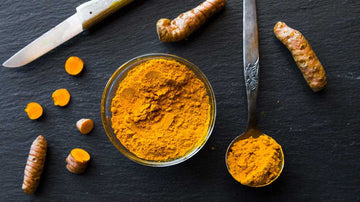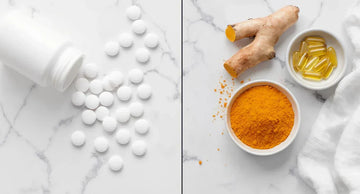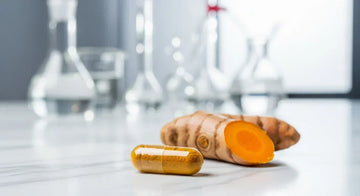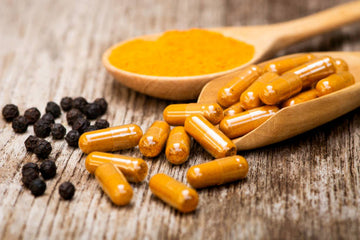You can find both "turmeric" and "curcumin" supplements next to each other in any health food store. If you ask most people what the difference is, they'll just look at you blankly.
The truth is that this confusion costs people money and, more importantly, the health benefits they want.
This guide cuts through the marketing noise to give you the facts about curcumin and turmeric, backed by clinical research. This will help you make the best choice for your health goals.
Table of Contents
- What is Turmeric? The Golden Root That Everyone Knows
- What is Curcumin? The Active Ingredient That Does The Hard Work
- The Real Problem: Your Body Can't Use Most of What You Eat
- The Math That Changes Everything
- Black Pepper: The First Breakthrough
- Nanotechnology: The Latest Breakthrough
- Turmeric or Curcumin: Which One Should You Choose?
- The OurJrney Approach
- What the Research Really Says
- How to Maximize Your Results
- Safety and Dosage Guidelines
- The Bottom Line
- Frequently Asked Questions
What is Turmeric? The Golden Root That Everyone Knows
The bright yellow spice that gives curry its color is turmeric. The Curcuma longa plant, which is in the ginger family, is where it comes from. People have used it in traditional medicine for more than 4,000 years.
When you buy turmeric powder at the store, you're getting the dried and ground-up root of the plant. There are a lot of chemicals in that powder, but here's what matters for your health:
There is only 2–5% curcumin by weight in turmeric powder.
Take a moment to think about that. About 95% of the stuff in a teaspoon of turmeric powder is other stuff, and only 5% is the compound that studies show is good for your health.
What is curcumin? The active ingredient that does the hard work
Curcumin is the main curcuminoid in turmeric. It's the chemical that does:
- The anti-inflammatory effects you hear about
- Most of the health benefits shown in clinical studies
Researchers almost always test concentrated curcumin extracts when they look into "turmeric benefits" not the spice powder you put on food.
What the research shows
A thorough review published in PubMed found that curcumin has great potential as a treatment, but it has one big problem: it doesn't absorb well.
The Real Problem: Your Body Can't Use Most of What You Eat
This is something that supplement companies don't want to talk about: your body doesn't absorb turmeric or regular curcumin supplements well.
According to NIH research, curcumin is:
- The liver breaks it down quickly.
- Not well absorbed by the intestines
- Quickly gotten rid of before it can help
This means that most curcumin supplements don't do much good in your body.
Phase I clinical trials showed that even doses of 12 grams per day only raised blood levels of curcumin very slightly.
The Math That Changes Everything
To get 500mg of curcumin (a typical research dose), you would need:
| Source | Amount Needed Daily | Practicality |
|---|---|---|
| Turmeric powder | 25-50 teaspoons | ❌ Impossible |
| Regular curcumin supplements | Multiple capsules | ⚠️ Poor absorption |
| Nano-enhanced formulations | Often just one serving | ✅ Superior absorption |
You can see why people get frustrated with turmeric supplements that "don't work."
Black Pepper: The First Big Step (But Not the Whole Answer)
PubMed published quantum chemical research that found that piperine, the active ingredient in black pepper, can make curcumin 20 times more available.
This changed everything for the supplement business. All of a sudden, curcumin supplements with black pepper extract became popular.
But here's something that most people don't know: even with piperine, absorption is still inconsistent and varies a lot from person to person.
Nanotechnology: The newest way to get curcumin into the body
Nanotechnology is the most promising new way to add curcumin to your diet. New research published in PubMed shows that nano-curcumin formulations greatly improve both how well they dissolve and how well they are absorbed by the body.
This is how it works:
- The particles of curcumin are made smaller, down to nano size.
- It's easier for these small particles to be absorbed.
- The body can really use what you eat.
Another study on solid lipid nanoparticles found that nano-encapsulation not only makes curcumin more stable, but it also makes it more effective over time.
Turmeric or Curcumin: Which One Should You Choose?
What you want to do will determine the answer:
Pick Turmeric Powder If:
- You want to add flavor and color to cooking
- You're looking for general antioxidant support
- You prefer whole-food approaches to nutrition
- Budget is a primary concern
Pick Curcumin Supplements If:
- You want targeted help with inflammation
- You need to take the same amount every time.
- You're taking care of certain health issues.
- You want the benefits shown in clinical research
Think about Nano-Curcumin If:
- You've tried regular curcumin and it didn't work
- You want the most absorption and bioavailability
- You like to take smaller amounts for better results.
- You really want benefits that are backed by research.
The OurJrney Approach: Why We Picked Nano-Technology
At OurJrney, we felt the same frustration that many customers do: we knew that curcumin had great potential, but we saw that traditional supplements didn't always work.
We made a choice after looking at the research on bioavailability problems. We didn't add more curcumin to fix absorption problems. Instead, we used nano-technology to make curcumin more bioavailable.
Our superfood nano turmeric curcumin drink mix uses cutting-edge particle reduction technology to make curcumin that your body can really use. This means that you get more out of less curcumin, instead of taking a lot and having most of it go through your body without being used.
What happened? A daily drink that gives you the curcumin benefits shown in studies, without the hassle of supplements that don't work.
What the Research Really Says About the Benefits of Curcumin
Clinical studies involving nano-curcumin have shown that:
- Signs of inflammation
- Comfort and movement in the joints
- Signs of heart health
- Overall level of antioxidants
What is the main difference?
These studies didn't use regular turmeric powder or basic curcumin supplements. Instead, they used formulations that were made to be more bioavailable.
How to Get the Most Out of Your Results
Here are some tips based on evidence to get the most out of turmeric powder, regular curcumin, or nano-enhanced formulations:
- Take with healthy fats - Curcumin is fat-soluble and absorbs better with fats
- Be consistent - Benefits build over time with regular use
- Choose quality sources - Look for standardized extracts and third-party testing
- Consider timing - Taking with meals may improve absorption
- Monitor your results - Keep track of how you feel over 4-6 weeks
Safety and Dosage Tips
Most people can safely use both turmeric and curcumin. But:
- Start with smaller doses and work your way up
- If you take blood thinners, talk to your doctor.
- Take note that curcumin may affect how some drugs work.
- Women who are pregnant or nursing should talk to their doctors before using.
Studies shows that curcumin is safe even in high doses, but the right amount to take depends on the formulation and how well it is absorbed by the body.
The Bottom Line: Pay attention to what your body can really use.
The most important thing is not how much curcumin you take, but how much your body can actually use.
Turmeric powder is great for cooking, but it doesn't have much therapeutic curcumin. Regular curcumin supplements usually have more curcumin than turmeric powder, but they still don't absorb well.
People who want the health benefits shown in clinical research should use nano-enhanced curcumin formulations.
Your goals will help you decide. To get the anti-inflammatory and health benefits that research shows, you need a form of curcumin that your body can actually use and absorb.
Are you ready to see what curcumin can do when it is properly absorbed?
Many people are frustrated with traditional curcumin supplements because they don't work well for them. Our nano-turmeric technology solves this problem.
Find out more about how our advanced formula works when others don't →
Frequently Asked Questions
How much curcumin is actually in turmeric?
Regular turmeric powder contains only 2-5% curcumin by weight. This means a teaspoon of turmeric powder provides roughly 50-100mg of curcumin, far below the 500-1000mg doses used in most clinical studies.
Why don't regular curcumin supplements work for everyone?
The main issue is bioavailability. Research shows that curcumin is poorly absorbed, rapidly metabolized, and quickly eliminated by the body. Many people take curcumin supplements but never achieve meaningful blood levels of the active compound.
Is nano-curcumin better than regular curcumin?
Clinical studies suggest yes. Nano-curcumin formulations significantly improve bioavailability and absorption compared to regular curcumin supplements. This means your body can actually use what you consume.
Can I just eat more turmeric to get enough curcumin?
To get therapeutic levels of curcumin from turmeric powder, you would need to consume 25-50 teaspoons daily, which isn't practical or safe. Concentrated, bioavailable formulations are more effective.
What about curcumin with black pepper?
Piperine (from black pepper) can increase curcumin absorption by up to 20-fold. However, this enhancement is still variable between individuals and doesn't solve all bioavailability issues.
How long does it take to see results from curcumin?
This depends on the formulation and your individual response. With highly bioavailable forms, some people notice benefits within 2-4 weeks of consistent use. Traditional supplements may take longer or may not produce noticeable effects.








